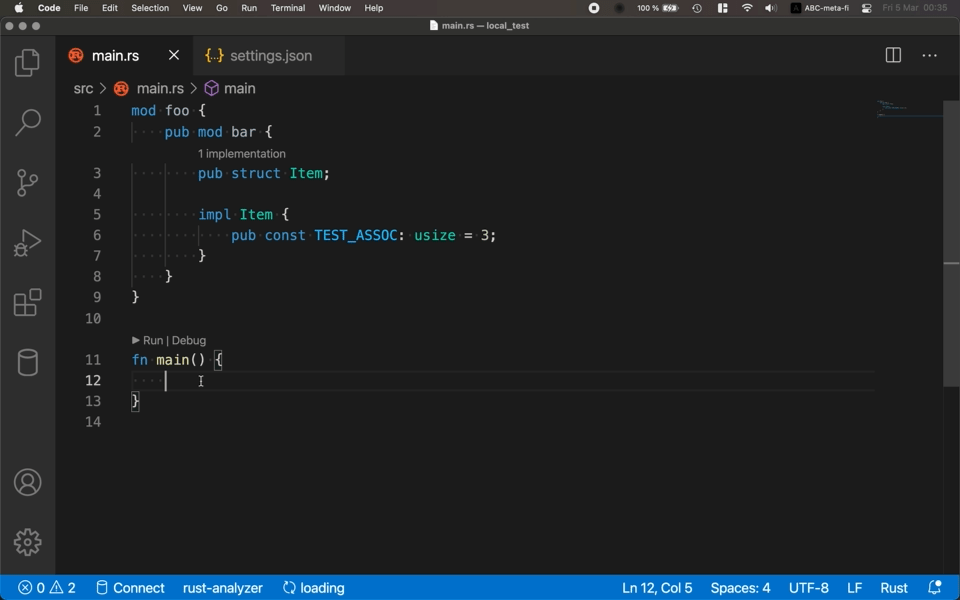8326: Rewrite reorder fields assist to use mutable syntax trees r=matklad a=Veykril
This also instead uses `Either` to use the typed `RecordPat` and `RecordExpr` nodes, this unfortunately gives a bit of code duplication
Co-authored-by: Lukas Wirth <lukastw97@gmail.com>
This adds a "Convert Into to From" assist, useful since clippy has
recently started adding lints on every `Into`.
It covers converting the signature, and converting any `self`/`Self`
references within the body to the correct types.
It does assume that every instance of `Into` can be converted to a
`From`, which I _think_ is the case now. Let me know if there's
something I'm not thinking of and I can try and make it smarter.
8267: Adding gifs and screenshots for features in manual r=matklad a=MozarellaMan
For #6539
This includes most of gif or screenshot examples of most items in the "Features" header. With the exceptions of:
- **On Typing Assists** - couldn't get it to work for a demo, I'm probably missing something?
- **Structural search and replace** - looked to be already a visual example of the feature
- **Workspace symbol** - wasn't sure how best to show this, all of the examples maybe? Also wasn't sure of the best code example to show it off
- **Semantic Syntax Highlighting** - seemed obvious enough to not need a screenshot, but I could easily add this
All the gifs/pngs are hosted in this [comment](https://github.com/rust-analyzer/rust-analyzer/issues/6539#issuecomment-809574840). Please let me know if any of them aren't suitable (and why) and I'll improve it! Or if you don't like the theme/font
Co-authored-by: Ayomide Bamidele <48062697+MozarellaMan@users.noreply.github.com>
7873: Consider unresolved qualifiers during flyimport r=matklad a=SomeoneToIgnore
Closes https://github.com/rust-analyzer/rust-analyzer/issues/7679
Takes unresolved qualifiers into account, providing better completions (or none, if the path is resolved or do not match).
Does not handle cases when both path qualifier and some trait has to be imported: there are many extra issues with those (such as overlapping imports, for instance) that will require large diffs to address.
Also does not do a fuzzy search on qualifier, that requires some adjustments in `import_map` for better queries and changes to the default replace range which also seems relatively big to include here.

7933: Improve compilation speed r=matklad a=matklad
bors r+
🤖
Co-authored-by: Kirill Bulatov <mail4score@gmail.com>
Co-authored-by: Aleksey Kladov <aleksey.kladov@gmail.com>
7898: generate_function assist: infer return type r=JoshMcguigan a=JoshMcguigan
This PR makes two changes to the generate function assist:
1. Attempt to infer an appropriate return type for the generated function
2. If a return type is inferred, and that return type is not unit, don't render the snippet
```rust
fn main() {
let x: u32 = foo$0();
// ^^^ trigger the assist to generate this function
}
// BEFORE
fn foo() ${0:-> ()} {
todo!()
}
// AFTER (only change 1)
fn foo() ${0:-> u32} {
todo!()
}
// AFTER (change 1 and 2, note the lack of snippet around the return type)
fn foo() -> u32 {
todo!()
}
```
These changes are made as two commits, in case we want to omit change 2. I personally feel like it is a nice change, but I could understand there being some opposition.
#### Pros of change 2
If we are able to infer a return type, and especially if that return type is not the unit type, the return type is almost as likely to be correct as the argument names/types. I think this becomes even more true as people learn how this feature works.
#### Cons of change 2
We could never be as confident about the return type as we are about the function argument types, so it is more likely a user will want to change that. Plus it is a confusing UX to sometimes have the cursor highlight the return type after triggering this assist and sometimes not have that happen.
#### Why omit unit type?
The assumption is that if we infer the return type as unit, it is likely just because of the current structure of the code rather than that actually being the desired return type. However, this is obviously just a heuristic and will sometimes be wrong. But being wrong here just means falling back to the exact behavior that existed before this PR.
Co-authored-by: Josh Mcguigan <joshmcg88@gmail.com>
7865: preserve escape sequences when replacing string with char r=Veykril a=jDomantas
Currently it replaces escape sequence with the actual value, which is very wrong for `"\n"`.
Co-authored-by: Domantas Jadenkus <djadenkus@gmail.com>
7880: Honor snippet capability when using the extract function assist r=lnicola a=Arthamys
This fixes issue #7793
Co-authored-by: san <san@alien.parts>
7741: Add convert_for_to_iter_for_each assist r=mattyhall a=mattyhall
Implements one direction of #7681
I wonder if this tries to guess too much at the right thing here. A common pattern is:
```rust
let col = vec![1, 2, 3];
for v in &mut col {
*v *= 2;
}
// equivalent to:
col.iter_mut().for_each(|v| *v *= 2);
```
I've tried to detect this case by checking if the expression after the `in` is a (mutable) reference and if not inserting iter()/iter_mut(). This is just a convention used in the stdlib however, so could sometimes be wrong. I'd be happy to make an improvement for this, but not sure what would be best. A few options spring to mind:
1. Only allow this for types that are known to have iter/iter_mut (ie stdlib types)
2. Try to check if iter/iter_mut exists and they return the right iterator type
3. Don't try to do this and just add `.into_iter()` to whatever is after `in`
Co-authored-by: Matt Hall <matthew@quickbeam.me.uk>